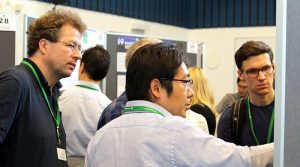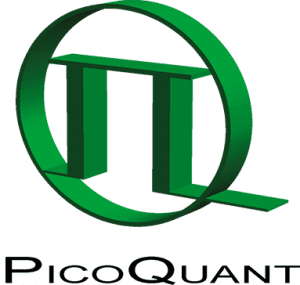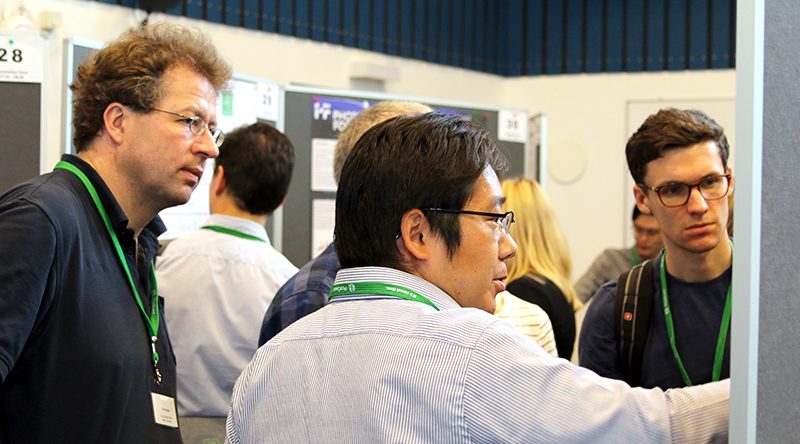Berlin (Germany), 29 November 2018 – After the resounding success of the first symposium edition, PicoQuant proudly announces that the second edition of the three day event will take place in Berlin, Germany from May 22 to 24, 2019. The symposium on “Single Photon based Quantum Technologies” provides an interdisciplinary platform for exchanging experience and information on recent findings in the field of single photon based quantum technologies.

Researchers from all over the world will meet on PicoQuant’s 2nd quantum symposium in Berlin to present and discuss recent developments in single photon based quantum technology.This photo was taken during a poster session at PicoQuant’s 1st international symposium on Single Photon based Quantum Technology.
Nine distinguished invited speakers from Europe and the USA will present their recent work in this field. Speakers are Rainer Blatt (University of Innsbruck, Austria), Tommaso Calarco (University Ulm, Germany), Fedor Jelezko (University Ulm, Germany), Giovanna Morigi (University Saarbrücken, Germany), Mark Thompson (University of Bristol, UK), Rinaldo Trotta (Sapienza Università di Roma, Italy), Edo Waks (University of Maryland, USA), Hugo Zbinden (Université de Genève, Switzerland), and Val Zwiller (KTH Royal Institute of Technology, Sweden).
Contributed oral presentations as well as a poster session round out the symposiums scientific program. A welcome reception provides participants with the opportunity for further discussions with the invited speakers and other attendees. Registration for the 2nd International Symposium on “Single Photon based Quantum Technologies” is open until April 22, 2019.
The first generation of quantum technologies such as transistors, solid-state lighting, lasers, or GPS have dramatically changed the world during the last 50 years. Today, we are paving the way for a second revolution by starting to exploit quantum phenomena such as superposition or entanglement. Breathtaking advances in creating and manipulating dedicated entangled and/or superimposed quantum states will lead to new technologies that promise to change our society in the next 5 to 20 years through revolutionary breakthroughs in imaging, sensing, communication, simulation, and computation. However, we are still at the beginning of transferring theory into technology in many of the related research fields.

Date: May 22–24, 2019
Location: Max-Born-Saal, Max-Born-Str. 2A, 12489 Berlin
Contact: PicoQuant GmbH
Kerstin Wicht
http://www.quantum-symposium.org
[email protected]
Invited speakers
- Rainer Blatt (University of Innsbruck, Austria)
“Quantum information processing with trapped ions” - Tommaso Calarco (University Ulm, Germany)
“Quantum control for quantum technologies”
- Fedor Jelezko (University Ulm, Germany)
“Quantum sensing with single spins in diamond”
- Giovanna Morigi (University Saarbrücken, Germany)
“Dynamics of quantum crystals of photons and atoms“
- Rinaldo Trotta (Sapienza Università di Roma, Italy)
“Quantum teleportation using photons from quantum dots”
- Edo Waks (University of Maryland, USA)
“Quantum photonics with strongly interacting photons”
- Hugo Zbinden (Université de Genève, Switzerland)
“Single photon detectors for long distance and high rate quantum key distribution”
- Val Zwiller (KTH Royal Institute of Technology, Sweden)
“High performance single photon detectors based on superconducting nanowires”
Excerpt of topics
- Single-photon detectors and sources
- Quantum metrology and sensing
- Quantum correlations and entanglement
- Quantum information processing, communication and QKD
- Integrated photonic quantum circuits
About PicoQuant
PicoQuant is a leading research and development company specializing in optoelectronics, which was founded in 1996. The company, based in the science and technology park of Berlin-Adlershof, Germany, is a worldwide leader in the field of single photon counting applications. The product portfolio encompasses picosecond pulsed diode lasers and LEDs, photon counting instrumentation, fluorescence lifetime spectrometers, FLIM and FCS upgrade kits for laser scanning microscopes as well as time-resolved confocal and super-resolution microscopes. Since April 2008 Sales and Support in North America is handled by PicoQuant Photonics North America Inc. The PicoQuant group employs currently around 80 people.
Contact
Nicole Saritas
Tel.: +49-30-1208820-608
[email protected]
www.picoquant.com
Press release provided by PicoQuant.

















